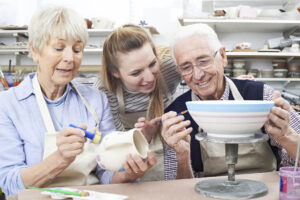
There are things you can do to help protect yourself or a loved one from the negative effects of loneliness and social isolation. First, it’s important to take care of yourself. Try exercising, eating healthy, getting enough sleep (7 to 9 hours), and pursuing activities you enjoy to help manage stress and stay as mentally and physically healthy as possible.
It’s also important to stay active and connect with others. People who engage in meaningful, productive activities they enjoy with others feel a sense of purpose and tend to live longer. For example, helping others through volunteering helps you feel less lonely and allows you to have a sense of mission and purpose in life, which is linked to better health. Studies show activities like these may help boost your mood and improve your well-being and cognitive function.
Find an activity that you enjoy, restart an old hobby, or take a class to learn something new. You might have fun and meet people with similar interests.
Schedule time each day to stay in touch with family, friends, and neighbors in person, by email, social media, voice call, or text. Talk with people you trust and share your feelings. Suggest an activity to help nurture and strengthen existing relationships. Sending letters or cards is another good way to keep up friendships.
Use communication technologies such as video chat, smart speakers, or even companion robots to help keep you engaged and connected.
If you’re not tech-savvy, sign up for an online or in-person class at your local public library or community center to help you learn how to use email or social media.Older adult holding a dog to combat loneliness and social isolation.
Consider adopting a pet if you are able to care for them. Animals can be a source of comfort and may also lower stress and blood pressure.
Stay physically active and include group exercise, such as joining a walking club or working out with a friend. Adults should aim for at least 150 minutes (2 1/2 hours) of activity a week that makes you breathe hard.
Introduce yourself to your neighbors.
Find a faith-based organization where you can deepen your spirituality and engage with others in activities and events.
Check out resources and programs at your local social service agencies, community and senior centers, and public libraries.
Join a cause and get involved in your community.
If you or a loved one has dementia and lives alone, family members, friends, or other caregivers may be able to help in different ways.
Identify a person you trust, such as a neighbor, who can visit regularly in-person or via a video call and be an emergency contact.
Learn about home- and community-based support and services from social service agencies, local nonprofits, and Area Agencies on Aging.
Stay connected with family and friends through video chats, email, and social media. If you’re not tech savvy, ask for help to learn.
